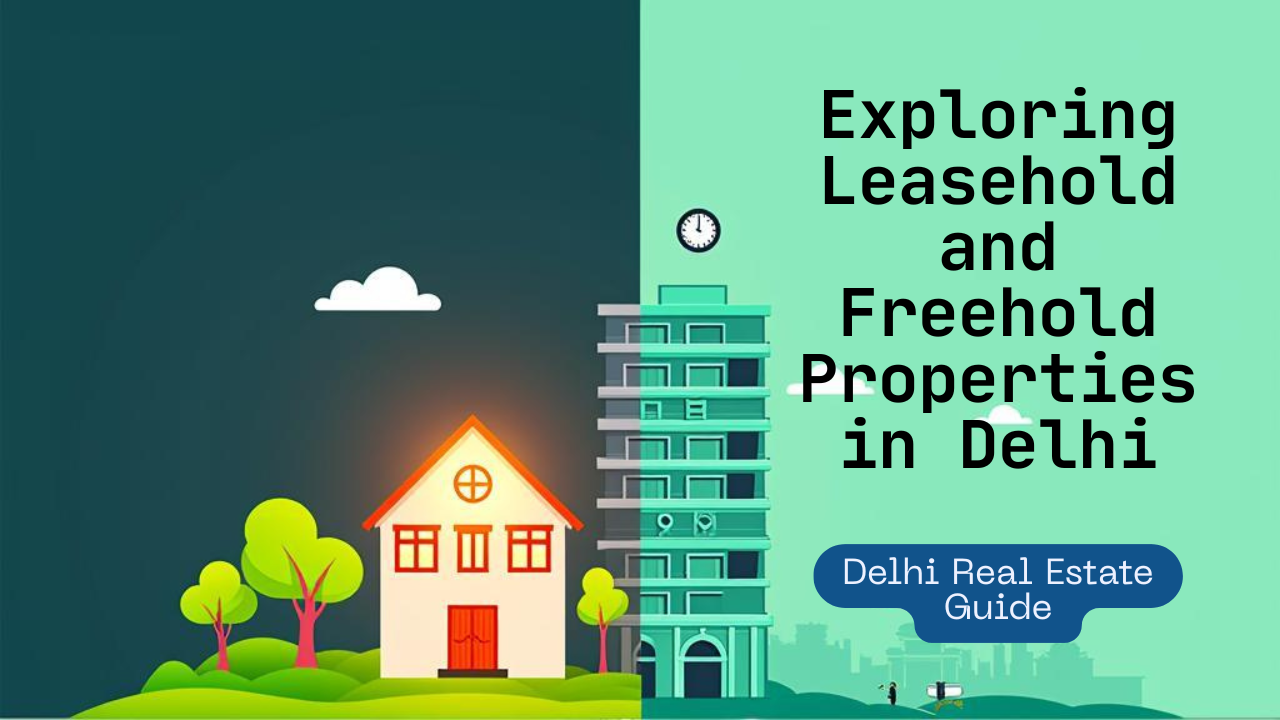When navigating Delhi’s real estate market, it’s crucial to comprehend the distinctions between leasehold and freehold properties. These ownership types significantly influence your rights, responsibilities, and the property’s long-term value.
What is a Freehold Property?
A freehold property grants the owner complete and indefinite ownership of both the land and any structures upon it. This form of ownership provides unparalleled autonomy, allowing you to:
- Modify and Renovate Freely: As the sole owner, you’re free to alter or expand your property without seeking external approvals.
- Transfer Ownership at Will: You can sell or bequeath the property without restrictions, ensuring flexibility in asset management.
- Enjoy Uninterrupted Tenure: There’s no concern about lease expirations or renewals, offering long-term security.
However, freehold properties often come with higher upfront costs. Additionally, you’re solely responsible for maintenance and any associated expenses.
What is a Leasehold Property?
In contrast, a leasehold property involves owning the building or flat for a specified period, while the land itself remains under the ownership of a landlord or government entity. Lease terms typically range from 30 to 99 years. Key characteristics include:
- Fixed-Term Ownership: Your rights to the property are confined to the lease duration.
- Ground Rent Obligations: Leaseholders often pay annual ground rent to the landowner.
- Limited Autonomy: Significant alterations or transfers may require the landowner’s consent. Raizada Associates
While leasehold properties can be more affordable initially, they may entail additional costs and potential complexities over time. NoBroker
Key Differences Between Leasehold vs Freehold Properties
Understanding the nuances between these ownership types is essential:
| Aspect | Leasehold Property | Freehold Property |
| Ownership | Ownership of the property for a set term; land remains with the original owner. | Complete and indefinite ownership of both the property and the land. |
| Duration | Limited to the lease term; property reverts to the landowner after lease expiry. | Perpetual ownership without any time constraints. |
| Control | Subject to lease terms; significant changes may need landowner approval. | Full autonomy to modify, renovate, or sell without external permissions. |
| Costs | Potential ground rent payments and other lease-related charges. | No ground rent; however, responsible for all maintenance and associated costs. |
| Value | May decrease as lease term shortens; can be harder to sell or mortgage with a short lease. | Generally retains value better and is more attractive to buyers and lenders due to indefinite tenure. |
Leasehold to Freehold Conversion in Delhi
Recognizing the advantages of freehold ownership, many Delhi residents seek to convert their leasehold properties. This transition offers enhanced security and flexibility. However, the conversion process has faced challenges:
- Procedural Delays: The Land and Development Office (L&DO) has experienced delays in finalizing the Standard Operating Procedure (SOP) for conversions, leading to backlogs and uncertainties for applicants.
- Legal Challenges: Some property owners have resorted to legal action to expedite their conversion applications, highlighting the complexities involved.
To navigate these challenges:
- Stay Informed: Regularly consult official sources or trusted real estate advisors for updates on conversion procedures and policies.
- Prepare Documentation: Ensure all necessary documents, such as the registered agreement to sell and proof of physical possession, are in order.
- Understand Financial Implications: Be aware of conversion fees and any other associated costs to plan your finances effectively.
Making an Informed Choice
When deciding between leasehold and freehold properties in Delhi, consider:
- Budget Constraints: Leasehold properties may offer a more affordable entry point, but assess long-term costs.
- Long-Term Plans: If you intend to hold the property indefinitely, freehold might provide better value.
- Property Usage: For commercial ventures or significant modifications, freehold offers greater flexibility.
- Market Trends: Be mindful of how lease terms can affect property value and marketability over time.
Conclusion
Understanding the distinctions between leasehold and freehold properties is vital for anyone involved in Delhi’s real estate market. Each ownership type presents unique advantages and considerations. By assessing your financial capacity, long-term objectives, and the specific property’s characteristics, you can make a well-informed decision that aligns with your needs.

